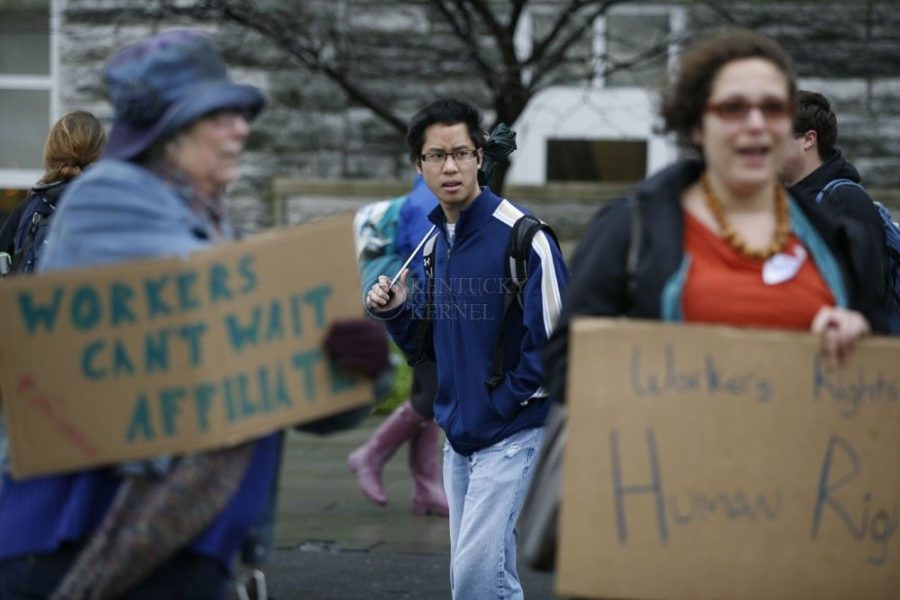Students protest sweatshops that produce UK apparel
January 31, 2013
Approximately twenty students gathered under an overcast sky Wednesday to make students and faculty more aware of the conditions in which their collegiate apparel is made.
A student organization called United Students Against Sweatshops (USAS) held a rally in front of the Main Building before meeting with President Eli Capilouto to discuss how UK could work to further workers rights.
USAS has been working since early December to convince UK to affiliate with the Workers Rights Consortium (WRC), an organization that would closely monitor the working conditions in companies that produce university merchandise, anthropology senior and USAS member Alli Sehon said.
Those involved held signs, chanted and sang in hopes of catching the attention and concern of passersby.
Communications junior Chelsea Moore was one of many students standing near the rally.
“I was a little confused when I saw it, but it’s interesting,” she said. “This will probably be effective to the president. I’m sure he will probably make a difference if this continues.”
Many who passed were wearing UK gear, including accounting sophomore Brett Johnson.
Looking at his own UK sweatshirt, Johnson was unsure if it was a product of sweatshop labor.
“It’s Nike, I don’t know if they use sweatshops,” he said. “But I’m sure it’s possible.”
Elementary education freshman Sara Thompson was disturbed to learn UK may be selling products that came from sweatshops.
“It’s emotional. It’s not something that you want to hear,” she said. “Obviously it’s good that they’re doing something about it. I’d like more information. I had never heard of that before.”
The protestors shouting through the drizzle were adamant their efforts are worth it.
“It’s really important that we support people everywhere, not just locally,” fourth year psychology graduate student Jessica Peters said. “We are connected by the things that they create and that we buy.”
When asked why this issue was so important, Peters said it was more a matter of the impact those rallying could have.
“It’s just one of the issues that I am concerned about,” she said. “But this is a huge issue that we can really do something about, if we can make a change that is doable, why not do it?”
USAS member and anthropology senior Alli Sehon agreed that much could be gained from targeting the collegiate apparel industry.
“The market for collegiate apparel is enormous, you can look around campus and see that everyone wears it,” Sehon said. “We want to impact the largest group possible.”
USAS member and engineering graduate student Rohith Jayaram was optimistic before the meeting with President Capilouto.
“I think we’ve got a diverse coalition of groups to come together to support this which will make us more effective,” Jayaram said.
Members of other student organizations such as the Muslim Student Association and the Environmental Society were there to support USAS’s efforts.
After the meeting with Capilouto, Sehon expressed gratitude for the opportunity to speak with him on the issue.
“He was very sympathetic and appreciative that students were getting involved and speaking up,” she said.
Public relations and marketing director Jay Blanton said Capilouto enjoyed speaking with the students.
“The president was very appreciative of the time with students today,” Blanton said. “He was very impressed with their commitment to this issue and the thoughtful approach they are taking to it.”
This is not the only group Capilouto has taken the time to meet with, Blanton said.
“It’s one of the things he enjoys most about his job,” Blanton said. “He wants to hear the things they are pleased with about the university. He also wants to hear their concerns.”
There was not a specific timeline of action Sehon said and Blanton confirmed.
“Overall we are really pleased with the cooperation that we got, but we plan to keep pushing forward to see results,” Sehon said.
USAS will stay in contact with Capilouto and the university about the issue.
“It is not done,” Sehon said. “It is never done, but particularly with this campaign we are not done yet.”


























































































































































